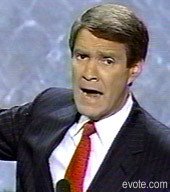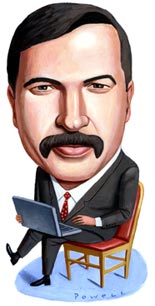CNN Follows Archrival Fox Downmarket,
While Mo Dowd Delivers Punch Like Old
I hate to be so simplistic, but I'll nevertheless continue (at least until further notice) to use Anderson Cooper as a weathervane for judging the overall health of CNN. To the extent that the once-serious news network continues to use the famously emotive globetrotting glam hearththrob as its poster boy in seeking better ratings, I shall persist in considering it Fox-lite. And really, who needs faux-Fox when you can just flip over to the real McCoy? Sorry, CNN, but those print ads in the serious papers (which depict Anderson doing actual reporting himself, actually wielding a notebook or a camera!) aren't very persuasive to anyone with an IQ in the triple digits. Okay, so maybe we shouldn't focus too much on Anderson, not when have the shrill pseudo-populist Lou Dobbs over on the next set. He exhibits all the grace of Father Coughlin railing about Jews during the Depression, as he awkwardly apes Bill O'Reilly with his crude campaigning about the dangers of outsourcing and immigration. Compared to these two boneheads, Wolf Blitzer and his often-spineless echoing of conservative talking point comes off as almost commiting misdemeanors.
The smart-ass right-wing stylist Matt Labash (admittedly a wicked delight for libs) gets off some good AC lines in this lively Weekly Standard piece. My favorite: he calls Cooper "an enigma wrapped in a mystery ensconsed in a French blue shirt..." And the L.A. Times's indispensible media critic Tim Rutten (who first came to my attention when he beat everyone in the entire media on his excellent ongoing coverage of the alt-weekly chain New Times' failed attempt to carve up the Cleveland and L.A. markets) nicely slices up Dobbs here.
And Speaking of Deconstruction, this cover story in the current TNR carves up the whole Oprah experience. In typical TNR fashion--at least when taking on the worst of pop culture and other lowbrow and middlebrow topics--it sometimes overreaches (I hope he's joking about the Oprahization of the electorate being the primary cause of both Clinton and George W's elections, though he may have a point with Clinton's) and can get a tad lost in overthinking the subject while drowning it in high-toned ridicule. But I find it entertaining and generally thoughtful, nonetheless. In the end, he concludes, the Big O condescends to her couch potato audience. "Oprah has accomplished an amazing trick, or even a miracle: She has turned living vicariously into living authentically."
A 'Skunkworks' That Became #2 Retailer. Forbes, the self-described "capitalist tool," may be best known for its dubious rankings of the world's richest individuals, an exercise in which it does entirely too little research and takes subjects' word for it entirely too much (Donald Trump is only the best example of many). But the biz mag can also make a good point on occasion. At the end of this otherwise forgettable piece, there's an aha moment: we learn that in the same year that Wal-Mart was founded, the Dayton Co., now Dayton-Hudson, set up its own discount outlet at a single location, almost as an experiment. That experiment eventually became Target. Proving once more that what was once on the periphery can sometimes become the next big thing.
Mo Dowd Hits a Nerve. NYT columnist Maureen Dowd is as good an example as any of the idea that every presidency tends to get the marquee columnist it deserves. Dowd was that columnist during the Clinton era: the pitch-perfect blend of cultural ironist and smart single gal who could see through all of Slick Willy's disguises. Her finely tuned bullshit detector (she was the daughter of an Irish-American cop, after all) and gift for turning a phrase brought an acid, icy realism to her deconstruction of the Clinton era and its abundant dysfunctions, however good they may look now by comparison. More recently, she's had to sit by and watch her colleague, Princeton economist Paul Krugman, become Bush II's chief nemesis. Tom Friedman, meanwhile, has for the most part kept his fast ball. In the page's constellation of bigfoot columnists, she was lately running a distinct third of three (sorry, but arch-lib Bob Herbert doesn't often move the needle, in part because he's become so predictable, and Dowd's onetime flame, and Howell Raines fishing buddy, the libertarian columnist John Tierney, has mostly been an abject embarrassment).
In recent years, she seemed as tired of the column as many of her longtime readers were, and began turning her attention to books, including an embarrassing volume in which she tried her best to explain her epic search for love as a disgusting remnant of the patriarchy's fear of strong women. There may have been other explanations. When she suddenly began appearing on TV for the first time a couple of years ago to hawk her earlier collection, about George W., some readers who'd never seen her were shocked at her appearance--she looked clinically depressed, all but unable to fake even a semblance of a half-smile for the cameras.
Against that backdrop, her column today hit with an angry, concussive thud (alas, like all NYT op-ed pieces, it's now locked behind the "Times Select" subscriber-only wall. You can get a free 14-day trial here). It's a welcome reminder of the old Dowd, and also a reminder that seriousness about public affairs never gets old. For once, she departs with the punch lines for the sake of punch lines, and delivers a solid, factual argument about Bush and his Iraq war that lands on the solar plexus. Who knew that more reporters have now been killed in this Iraq conflict than either Vietnam or World War II (I certainly didn't)? It's facts such as these, which were no doubt reported elsewhere but which I've missed until now, that help tell a story in ways that burn it into readers' brains. Welcome back, Ms. Dowd. Here's hoping you keep passing up the punchlines and stay focused on the meat. Lord knows there's plenty to be had just now.






